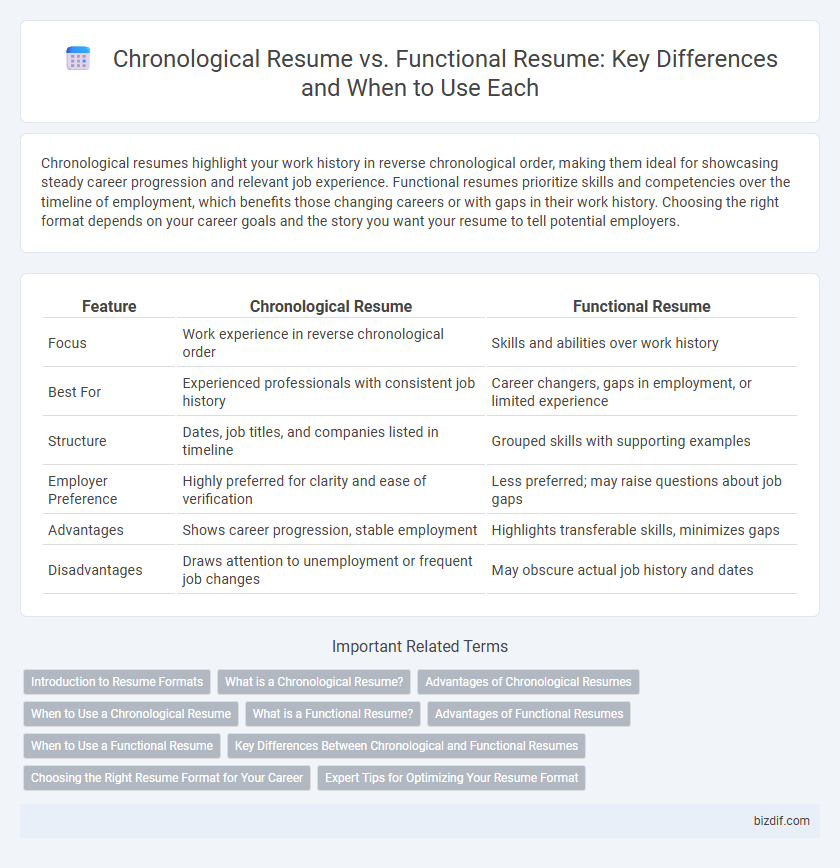Chronological resumes highlight your work history in reverse chronological order, making them ideal for showcasing steady career progression and relevant job experience. Functional resumes prioritize skills and competencies over the timeline of employment, which benefits those changing careers or with gaps in their work history. Choosing the right format depends on your career goals and the story you want your resume to tell potential employers.
Table of Comparison
| Feature | Chronological Resume | Functional Resume |
|---|---|---|
| Focus | Work experience in reverse chronological order | Skills and abilities over work history |
| Best For | Experienced professionals with consistent job history | Career changers, gaps in employment, or limited experience |
| Structure | Dates, job titles, and companies listed in timeline | Grouped skills with supporting examples |
| Employer Preference | Highly preferred for clarity and ease of verification | Less preferred; may raise questions about job gaps |
| Advantages | Shows career progression, stable employment | Highlights transferable skills, minimizes gaps |
| Disadvantages | Draws attention to unemployment or frequent job changes | May obscure actual job history and dates |
Introduction to Resume Formats
Chronological resumes highlight work experience by listing jobs in reverse chronological order, ideal for candidates with consistent employment history. Functional resumes emphasize skills and accomplishments over specific job dates, suitable for those with gaps or varied career paths. Choosing the right format depends on career goals and the ability to showcase relevant strengths effectively.
What is a Chronological Resume?
A chronological resume presents work experience in reverse chronological order, highlighting recent positions first to showcase career progression. It emphasizes job titles, employers, and dates of employment, making it ideal for candidates with a consistent work history. Recruiters favor chronological resumes for their clear structure and easy-to-follow timeline of professional achievements.
Advantages of Chronological Resumes
Chronological resumes highlight a clear career progression by listing work experience in reverse chronological order, making it easier for employers to track professional growth and stability. This format emphasizes relevant job titles and dates, enhancing the resume's credibility and suitability for industries valuing consistent experience. Recruiters often prefer chronological resumes because they quickly reveal a candidate's most recent roles and accomplishments.
When to Use a Chronological Resume
A chronological resume is ideal for job seekers with a consistent work history and clear career progression, showcasing experience in reverse chronological order. It effectively highlights promotions, relevant job titles, and steady employment, making it preferred by employers seeking well-established candidates. Use a chronological resume when your goal is to emphasize reliability, career growth, and specific accomplishments within related industries.
What is a Functional Resume?
A functional resume emphasizes skills and qualifications over chronological work history, highlighting key competencies relevant to the job. It is ideal for candidates with gaps in employment or those changing careers, as it de-emphasizes specific job timelines. Employers reviewing functional resumes can quickly identify an applicant's strengths and relevant expertise without focusing on past job dates.
Advantages of Functional Resumes
Functional resumes emphasize skills and qualifications over chronological work history, making them ideal for candidates with employment gaps or career changes. This format highlights relevant expertise and accomplishments, helping to capture the attention of recruiters seeking targeted competencies. Functional resumes also minimize potential bias related to dates, allowing applicants to present their strongest attributes upfront.
When to Use a Functional Resume
A functional resume is ideal for job seekers with employment gaps, career changers, or those with diverse skill sets unrelated to their work history. It highlights abilities and accomplishments over chronological work experience, making skills more prominent. This format is effective when relevant expertise outweighs the importance of specific job titles or dates.
Key Differences Between Chronological and Functional Resumes
Chronological resumes emphasize work experience arranged by dates, showcasing a clear career progression and consistent job history ideal for applicants with a strong employment record. Functional resumes highlight skills and qualifications over chronological work experience, making them suitable for career changers or those with employment gaps by focusing on relevant competencies. The key difference lies in presentation: chronological resumes prioritize job titles and timelines, while functional resumes prioritize skill sets and achievements.
Choosing the Right Resume Format for Your Career
Choosing the right resume format between chronological and functional depends on your career history and goals. Chronological resumes highlight a clear work timeline, ideal for candidates with consistent employment and upward career progression. Functional resumes emphasize skills and achievements, making them suitable for career changers or those with employment gaps.
Expert Tips for Optimizing Your Resume Format
Choose a chronological resume to highlight consistent work experience and a clear career progression, emphasizing recent roles and achievements for maximum impact. Opt for a functional resume to showcase skills and expertise when addressing employment gaps or career changes, focusing on relevant competencies over dates. Tailor your format based on job requirements, using quantifiable results and targeted keywords to pass applicant tracking systems effectively.
Chronological Resume vs Functional Resume Infographic

 bizdif.com
bizdif.com